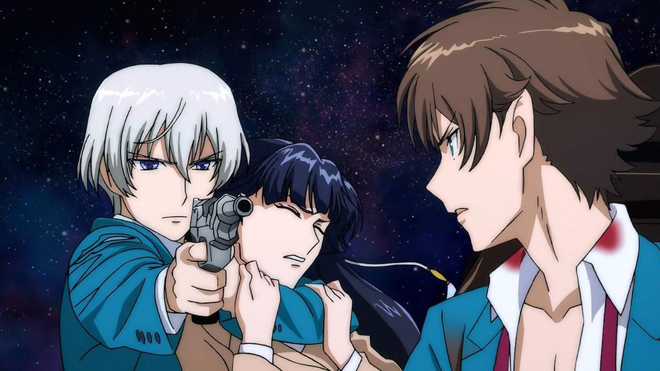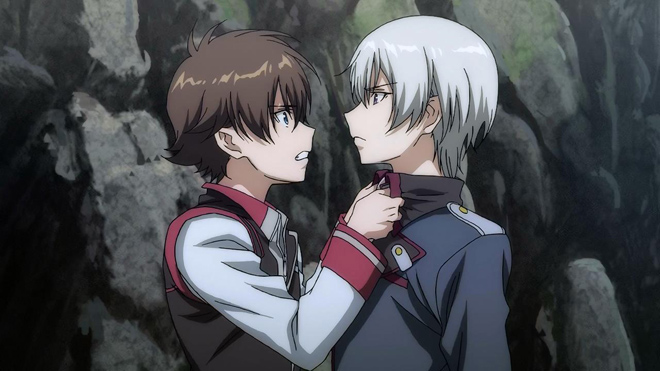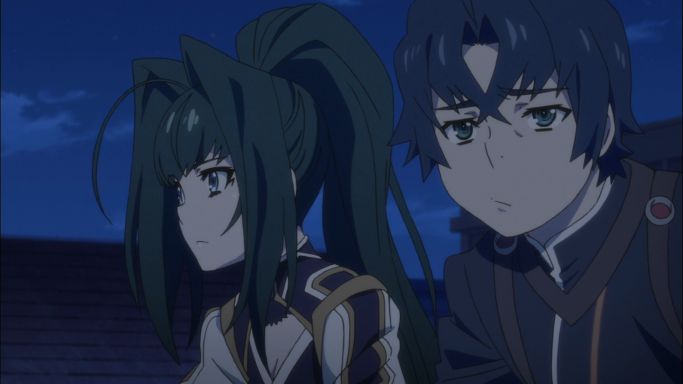Valvrave: the Liberator– Half Revealing the Truth of the World
This is a review for the entire Valvrave: the Liberator series. Alex has a review of season one and season two.
I wrote an awful lot about Sunrise’s Valvrave: the Liberator in 2013. The anime caught my eye during the spring and captivated me for the entire season. I was sad to see it go on break during the summer and was excited when it returned in the fall. I had extremely high hopes for Ichiirou Ohkouchi’s script because he was the same man who composed both seasons of Code Geass. Ko Matsuo may have been the director but Valvrave was written by Ohkouchi. On paper the strange mash-up of ideas that is Valvrave should’ve been a major disaster. This anime incorporated every plot device imaginable (vampires, high school students, space Nazis, secret societies, etc) and it’s easy to get the sense the entire series could come apart at any time. To their credit Ohkouchi and Matsuo managed to hold everything together. That said, when Valvrave ended I realized it focused too heavily on plot twists and not enough on connecting the many disparate plot elements. Regardless of my disappointment I still enjoyed this anime, flaws and all.
In the True Calendar (T.C.) year of 71 most of humanity has migrated from Earth to space and live in “Dyson Spheres,” or small artificial enclosures. The neutral colony of JIOR is a peaceful and prosperous country, unlike the Dorssia Military Pact Federation and the economic powerhouse of ARUS. The peace isn’t destined to last long as five teenage Dorssian soldiers infiltrate the JIOR colony, Module 77. The module is a school colony composed of Sakimori High school students. Unknown to the students JIOR actually has humanoid military weapons known as Valvraves hidden under the school. L-elf Karlstein, the strategist of the Dorssian group crosses paths with Haruto Tokishima, a laid back pacifist. Not long after their encounter JIOR is attacked by Dorssia, including Module 77. In the chaos a number of students are killed and Haruto fears his best friend and love interest, Shoko Sashinami is among the dead. Enraged, he stumbles upon a Valvrave and climbs into the giant mech in order to exact revenge against Dorssia. In order to pilot the machine he has to give up his humanity and does so without considering the consequences.

After a blood pact with the Valvrave is made Haruto’s injuries are instantly healed and he effortlessly drives the Dorssians out of Module 77. After the fight he’s confronted by L-elf and is brutally murdered. As the silver-haired Dorssian begins to claim the mech Haruto revives and attacks him. During the attack Haruto hijacks L-elf’s body (leaving his own body unconscious), meets up with a few of his friends, retrieves his Valvrave and kicks the rest of the Dorssians out of the module. During the fight L-elf is branded a traitor by his homeland. Once Haruto regains the use of his own body L-elf awakens to discover he’s now a wanted man. He’s taken in as a prisoner by friendly forces on the JIORian colony. At the same time Haruto learns Shoko is alive and well. He nearly breaks down as the weight of giving up his humanity hits him. The teenager has now become an immortal being who occasionally feeds on humans like a vampire. Even so, he is able to put on a brave face for his friends. L-elf slips out of JIORian custody and blends into the student body. Later he finds Haruto and proposes the former pacifist make a pact with him in order to free his homeland of Dorssia. The JIORian is horrified at the idea of being manipulated into helping an enemy.
Fortunately, Shoko devises a plan for the students in Module 77 to break away from the Dorssian controlled JIOR and to form their own country. The students unceremoniously christen the module as “New JIOR” and Haruto is tasked with defending it from Dorssia with his Valvrave. Later, four more Valvraves are discovered by L-elf and he manipulates events within the colony in order to find suitable pilots. (The analytical Dorssian quickly discovers only JIORians can pilot the Valvraves.) At the same time, New JIOR is constantly attacked by Dorssia and Haruto realizes he and his fellow students have no military experience and can’t defend the colony on their own. He finally takes the Dorssian refugee up on his pact and a new alliance is born. Haruto and the other Valvrave pilots defend JIOR with their brawn while L-elf uses his exceptional intelligence to help realize a country run entirely by high school students.

Like the high school students who formed their own country Valvrave is too ambitious for its own good. Ohkouchi’s everything-including-the-kitchen-sink approach comes back to haunt the series in its latter half with bad pacing and a rushed ending. The majority of Valvrave’s charm and potential is contained within season one. The plot is filled with exciting twists and turns, making the story both unpredictable and exhilarating. The adventures of the students in Module 77 and L-elf are an interesting mixture of silliness and suffering in nearly equal parts. Musicals, mysteries, mayhem and murder are all valid parts of the story and the ridiculousness of it all isn’t lost on the savvier characters. The combination of events never seem to take themselves too seriously for the majority of season one. It becomes clear one should not take this half of Valvrave too seriously either.
The second season of Valvrave is literally and relatively grounded in comparison to season one, as the series moves from space to Earth. The silly nature of the show all but disappears and instead focuses on trying to reveal the mysteries introduced earlier. As questions are answered more questions arise. Nothing is truly addressed in a fully satisfying manner. Halfway through season two it becomes clear all of Valvrave’s important plot points won’t be tackled within the allotted episodes. Watching the anime then becomes an exercise in wondering how haphazardly it will end. I got the sense Ohkouchi introduced a fantastic story, pegged away at the script and then forgot he was supposed to wrap everything up within 12 episodes.

When the final credits rolled it was clear the strange journey was more appealing than the final destination. Getting to the finish line was not a smooth process. The multitude of ideas that would have bridged the series’ numerous time skips to the ending were completely forgotten by the writers. The Golden Seven Valvrave pilots present 200 years in the future? Saki Rukino’s redesigned Valvrave? The enemy she and the other Valvrave pilots were fighting against in the future? Just a few of the many events that were skipped over, only brought up in supplemental reading material, never mentioned again or left to viewers’ imaginations. If Valvrave had been four or five episodes longer I’m certain those points would’ve been covered and the ending wouldn’t have felt so rushed.
The characters are my second biggest issue with Valvrave. The progression and development of the cast was a mixed bag. I’ll start with my biggest disappointment, Haruto. He was part of a main character duo but over the course of two seasons he never really grew out of his milquetoast tendencies. In fact, during the course of season two he actually regressed! In season one he occasionally made a few grandiose statements or took some much needed action even though he was a pacifist at heart. In season two his personality did a completely frustrating reversal, effectively undoing his character growth. When Haruto needed to be bold and assertive he was timid and meek. When he needed to stand up for his ideals or to explain his actions he was at a loss for words and easily pushed around by others. It was clear he was little more than L-elf’s pawn for almost all of season two. L-elf, an already awesome character, was given back story and development but it wasn’t enough to cancel out my frustrations with Haruto.

To heap on the annoyances, other side characters were given much needed development and then had almost no screen time (or they died). Shoko’s character developed immensely. She grew out of a very whimsical student into a leader not afraid to take action and to put the needs of others over her own. Saki grew from a manipulative idol into a mostly competent solider and friend. Too bad both characters were either off screen or missing in action for the majority of season two. Even Marie, Inazuka, and Akira were given significant amounts of development and then barely seen for the remainder of season two. Once again, my dissatisfactions with the side characters stems from Valvrave being rushed at the end and not having enough time to flesh everything out. Except for Haruto, there were no excuses for his pathetic regression.
One constantly impressive area of Valvrave was the music. Composer Akira Senju’s score was fitting and his violin pieces were beautifully haunting. They were great for setting the mood whenever a character suffered a major trauma. That said, the rest of the soundtrack is fairly forgettable. However, I found the opening and closing themes to be among the best I’ve heard in a very long time. It’s not surprising with heavy hitting artists like T.M. Revolution, Nana Mizuki, Angela, Momoko Kanade and ELISA performing the theme songs. I’ll say it now, Angela’s “Boku Janai” and Nana Mizuki and T.M. Revolution duo “Kakumei Dualism” were two of my very favorite themes from both seasons.

Valvrave the Liberator is a series filled with contradictions. It is a parody and manages to pay homage to the mech shows that came before it. It also feels like a spiritual successor to Code Geass set in space. Season one comes off as a series not to be taken seriously and yet has no problems making the majority of the cast suffer. Season two focuses more on world building and ups the teenage suffering by multiple degrees. Valvrave also introduces a lot of interesting concepts and plot points. Sadly, nothing is fully resolved by the show’s end thanks to bad pacing and a rushed final episode. In many ways it is a typical Sunrise series, filled with promise but slightly disappointing when everything is said and done. Even with all its flaws I enjoyed Valvrave immensely and I would still recommend trying the series. If you find season one to be even remotely appealing by all means finish the show– you could do a lot worse.
Images courtesy of Random Curiosity.





